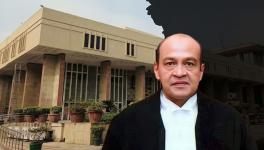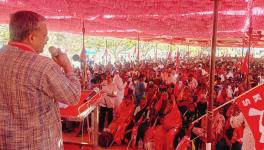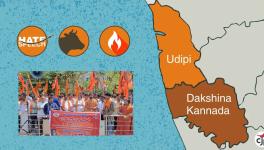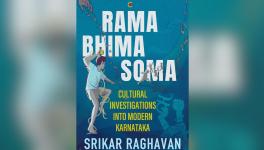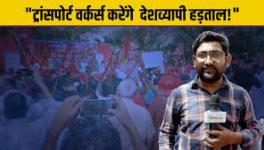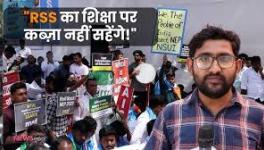Srinivasan Ramani(SR) – Hello and Welcome to Newsclick. In the recent days we have seen that a number of unprecedented scams have come in to the limelight involving the role of the political executive but, at the same time, serious complaints of corruption and impropriety have been made against members of the judiciary. We have with us today, R Vaigai, Advocate in the Chennai High Court, who is also the convenor of the forum for judicial accountability, which has waged a number of battles against corruption in the judiciary. One would remember that the FJA was in the forefront of the battle against the elevation of Justice PD Dinakaran, against whom a number of allegations of corruption and disproportionate assets were made. Welcome to Newsclick.
The allegations against Justice PD Dinakaran are pretty serious. Tell us in brief, how the FJA took up this issue in the first place. And do you think that the actions taken so far, by the higher judiciary, in this case, are adequate?
Adv. R. Vaigai (RV) – See, our forum's main purpose is to call for accountability and transparency in the working of the judiciary and there are very few people who are willing to take up causes of exposing corruption within the judiciary, for fear of reprisal (such as the contempt power). So when Justice Dinakaran's elevation was in the offing, we suddenly received a number of complaints and we scrutinised them and most of them were founded on a very strong basis. We scrutinised the documents and then we thought that the matter was cause for urgent action and therefore we wrote to the Supreme Court Collegiums about adding all the materials that we had. We placed them before the collegiums and said that this needs to be looked at, because otherwise appointment of a person, who, if the allegations were true, to the highest body of the judiciary, would have had disastrous consequences. Therefore, we thought that we should take it up seriously, and we did.
SR - How do you think the proceedings have gone, after these allegations were made?
RV - Well, people were a little disheartened over the fact that the high judiciary was initially dragging its feet over an urgent response, including the law ministry which was involved at some stage. Because the Chief Justice of India had asked the ministry to rope in the survey of India and to do some investigations, but i think, finally, we managed to get through the impeachment motion signed by the members of parliament and now that the investigation is on, we just hope that a proper inquiry is made and people know the truth.
SR - Relatedly, the ex-CGI, Justice KG Balakrishnan was also in the news recently. He is now the chairman of the NHRC. Allegations of disproportionate assets have been made against him, as well. One would remember that he refused to voluntarily declare his assets.
RV - It definitely does and in fact when CJ Verma was there, way back in 1997, a resolution had been passed in a conference of Chief Justices, that justices would voluntarily disclose their assets. Of course, it was to be kept confidential with the CJI. But even that had not been complied with by many Judges and increasingly, particularly after the RTI act has come into place, you have a statute governing the field, I don't really see why the judiciary should resist it and it was sad to see the judiciary fighting its battle before the Delhi High Court and the Supreme Court itself becoming a litigant and resisting this kind of accountability, which I think is very much in order.
SR - One reason why the media is not active enough in covering the issue of judicial accountability is that it suffers from the fear of the Contempt of Court Act. Don't you think this Act need to be sufficiently modified so as to reflect democratic aspirations?
RV – It does. In fact, there has been an amendment now, which provides for truth as a defence and, i think, the test case will be the pending proceedings in the Supreme Court against Advocate Prashant Bhushan, who has spoken against corruption in the judiciary quite openly and the judiciary has initiated contempt proceedings and his defence is that whatever he stated is backed by truth they are all statements of facts. So i think that it would be a really testing case for this principle that truth can be a defence. You see, 'contempt' is basically to uphold the dignity of the court. Now the question is- dignity at what cost. You can't hide facts or hide the corrupt behind the facade of 'contempt', because that would damage the institution itself. You can't talk about dignity of an institution when that institution is completely shattered.
SR – Another issue that crops up when one looks at the Justice Dinakaran case is the whole process of appointment to a higher post in the judiciary. Do you think the current procedure is adequate enough or does it suffer from certain lacunae and if so, what do you think the alternate or better mechanism for judicial appointments is?
RV- See, our entire governance is based on democracy. The constitution's basic structure says democracy so every institution's functioning should be democratic. Earlier, before the Judge's case was decided by the Supreme Court, the appointment process was essentially controlled by the executive, and it's the political executive which chooses the candidate and the Chief Justice can only have a say, but ultimately it is the political executive which prevails and the presidential appointment would follow. Now the judiciary has wrested that authority from the executive. Now everything takes place behind closed doors.
Apart from that, there are no proper criteria laid down for selection of candidates. One merely goes by seniority at the bar, the volume of practice, what is their income and what kind of practice have they had. Namely civil, criminal, income tax or whatever it may be. Now this is all that has been asked, to see whether a candidate is fit to be a judge or not. But I think these are all secondary materials, of course your experience at the bar matters, but you could have been a lawyer for 20 years and never served the people; never espoused the people's interests; never argued for the translation of the constitutional goals into reality. So a person who may have only appeared for the mafia or for vested interests, when he becomes a judge, he will never be the voice of the people, on the bench. Therefore, the entire criteria for selection will have to be re-looked at. Apart from that, there ought to be a greater transparency in the selection process so that people know who are being selected and on what basis.
SR- What kind of institutional amendments would you like to have?
RV – I think, generally, informed sections of people, both in the legal fraternity and outside, have asked for a judicial commission, which will comprise of voices of the government and the judiciary, the opposition and jurists or certain responsible sections of the civil society and it'll be a more open process of appointments, with very laid down criteria and a structural mechanism for the election process itself. Such a commission should also have the power to oversee the functioning of the judges.
SR – As of now, one can't launch criminal proceedings, or any other type of proceedings against judges. Also the only constitutional way of looking into criminal misconduct is through the impeachment process, which is quite laborious.
RV - The impeachment process has become laborious because of the requirement that you need to have, if it goes through the Rajya Sabha- 50 members of Parliament supporting it to present the motion, or a 100 if it goes through the Lok Sabha. And various kinds of political considerations and compulsions come into play because Members of Parliament don't all necessarily act only in the interest of the well being of the judiciary, but they have their own political considerations, timings, strategies and many other things coming into play. So its not easy to get support for even the presentation of the motion. After you present the motion then it has to be referred to an inquiry committee and the inquiry process takes place and if the committee finds for the removal of the judge, you are not sure whether the process of converting it into an acceptance and resolution by the parliament will ultimately happen. As it did in the Justice Ramaswamy's case. As the enquiry committee found him guilty, ultimately the majority party stayed away from the voting and therefore the motion fell through. So it is a very cumbersome process which has not really kept pace with the times. It was evolved at a time when corruption within the higher judiciary was not thought of at all. We need to have a quicker mechanism.
SR – In one sense, this near immunity that a judge enjoys; shouldn’t that be revoked?
RV – I feel impeachment is just one aspect of the process; you constitutionally remove that person from his office if there are enough facts to show that the judge concerned has committed a crime, then it’s really not necessary that you should completely cocoon him from the normal process of law, because in Justice Veeraswamy’s case, the Supreme court, in order to protect the judges from unsavoury or unnecessary allegations, they felt they needed to protect them and therefore they said even to register an FIR the police will have to get the approval of the CJI before they can take any action. Now in my view, it’s not really necessary because the judges are well versed in law and if they feel that it was litigation which was baseless, they could take recourse to the courts like any other person. It’s really not necessary to provide that kind of immunity.
SR – For better accountability, do you think a different mechanism should be evolved from what is already there?
RV – If the judicial commission is put in place- that will be an appointment commission, as well as an ombudsman, which will be an overseeing body. It need not… misbehaviour among the judges is something which is judged from a higher yardstick than that used to judge an ordinary government servant or an employee, therefore one needn’t look at the letter of the law to see whether the judge has crossed the line. If it’s an act of impropriety, even that could be pulled up by the commission or they could advise the judge not to cross the line therefore I think the commission is a better idea than merely relying on the impeachment proceedings or the normal criminal prosecution or any other civil litigation.











